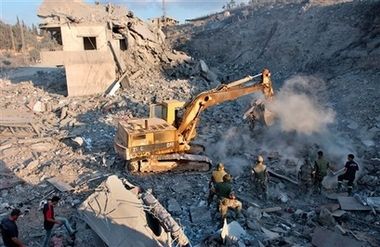 DAY 15, BEIRUT (Reuters) – Israel launched a heavy air and artillery bombardment of south Lebanon on Thursday after nine Israeli soldiers were killed in the Jewish state’s worst 24 hours for casualties in a 16-day-old conflict against Hizbollah. Israeli warplanes destroyed communication masts north of Beirut and attacked three trucks carrying medical and food supplies to the east, security sources said. They said two truck drivers were killed. Israel accuses Lebanon’s eastern neighbor Syria of supplying Hizbollah guerrillas with weapons.
DAY 15, BEIRUT (Reuters) – Israel launched a heavy air and artillery bombardment of south Lebanon on Thursday after nine Israeli soldiers were killed in the Jewish state’s worst 24 hours for casualties in a 16-day-old conflict against Hizbollah. Israeli warplanes destroyed communication masts north of Beirut and attacked three trucks carrying medical and food supplies to the east, security sources said. They said two truck drivers were killed. Israel accuses Lebanon’s eastern neighbor Syria of supplying Hizbollah guerrillas with weapons.
Other Israeli aircraft blasted targets in and around several villages and towns in the mainly Shi’ite Muslim south, and artillery batteries opened up from Israel’s side of the border.Hizbollah guerrillas killed nine Israeli soldiers in house-to-house fighting in a border town and a nearby village on Wednesday, as senior international diplomats failed at a Rome conference to agree on calling for an immediate ceasefire.
An Israeli general said the offensive, which has killed 433 Lebanese, mostly civilians, would go on "for several more weeks." The fighting began on July 12 when Hizbollah captured two Israeli soldiers and killed eight in a cross-border raid.A total of 51 Israelis have been killed in Hizbollah attacks that have included rockets being fired into northern Israel.Foreign ministers at the Rome conference pledged to work urgently for a "lasting, permanent and sustainable" ceasefire but did not call for the fighting to stop now, as Lebanon and its Arab allies had demanded.
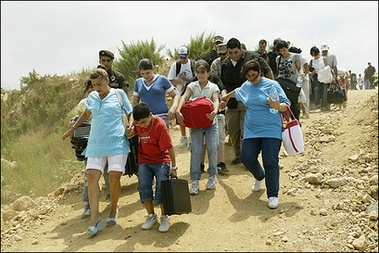 Callie Lefevre, I am one of the many American students evacuated from Lebanon in the last week. I’ve been asked to write about the experience, which I do gladly but with the significant caveat that the reader understands that my experience was nowhere near as tragic and intense as the experience of the average Lebanese in Beirut at this time. For me, even before war broke out, my stay in Lebanon had a sense of unreality–of being so remote from my usual experience that I imagined myself more a character in a fiction than Callie Lefevre in reality. In its opening chapters, it was a wonderful, romantic story, slightly more exciting than the usual study abroad story because of the greater potential for discovery and adventure in the Middle East. But even when the story turned somewhat frightening and sad, it was still a story, more or less. I always held within me the comforting knowledge that my home stood waiting for me, on a little undisturbed cobblestone street in Philadelphia, if only, like Dorothy, I could get back to it. Beirut is not my permanent home, and its concrete and glass high-rises that have become piles of grey rubble don’t house the memories of my childhood or of aunts and uncles opening their doors to holiday feasts. To see a pile of grey rubble and know that it was your home, to see the body of a seven year old girl in little blue pajamas and know that it was your younger sister (who yesterday smuggled a baby chick into the car so it would be safe from the bombs) is real experience on a very different plane than the one I occupied
Callie Lefevre, I am one of the many American students evacuated from Lebanon in the last week. I’ve been asked to write about the experience, which I do gladly but with the significant caveat that the reader understands that my experience was nowhere near as tragic and intense as the experience of the average Lebanese in Beirut at this time. For me, even before war broke out, my stay in Lebanon had a sense of unreality–of being so remote from my usual experience that I imagined myself more a character in a fiction than Callie Lefevre in reality. In its opening chapters, it was a wonderful, romantic story, slightly more exciting than the usual study abroad story because of the greater potential for discovery and adventure in the Middle East. But even when the story turned somewhat frightening and sad, it was still a story, more or less. I always held within me the comforting knowledge that my home stood waiting for me, on a little undisturbed cobblestone street in Philadelphia, if only, like Dorothy, I could get back to it. Beirut is not my permanent home, and its concrete and glass high-rises that have become piles of grey rubble don’t house the memories of my childhood or of aunts and uncles opening their doors to holiday feasts. To see a pile of grey rubble and know that it was your home, to see the body of a seven year old girl in little blue pajamas and know that it was your younger sister (who yesterday smuggled a baby chick into the car so it would be safe from the bombs) is real experience on a very different plane than the one I occupied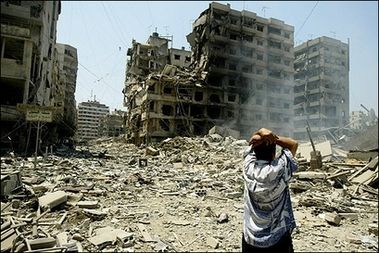 DAY 14 – BEIRUT (Reuters) – Hizbollah vowed on Wednesday not to accept any "humiliating" conditions for a truce with Israel, as the Israeli killing of four U.N. observers piled pressure on an international conference in Rome to end the 15-day conflict.United Nations, Secretary General Kofi Annan demanded an Israeli investigation into the "apparently deliberate targeting" of a U.N. post in southern Lebanon where an Israeli air strike killed the four U.N. military observers on Tuesday.Lebanon and its Arab allies will plead at the Rome conference on Wednesday for an immediate ceasefire in Israel’s war against Hizbollah guerrillas, but the United States will insist a lasting solution needs to be agreed first.
DAY 14 – BEIRUT (Reuters) – Hizbollah vowed on Wednesday not to accept any "humiliating" conditions for a truce with Israel, as the Israeli killing of four U.N. observers piled pressure on an international conference in Rome to end the 15-day conflict.United Nations, Secretary General Kofi Annan demanded an Israeli investigation into the "apparently deliberate targeting" of a U.N. post in southern Lebanon where an Israeli air strike killed the four U.N. military observers on Tuesday.Lebanon and its Arab allies will plead at the Rome conference on Wednesday for an immediate ceasefire in Israel’s war against Hizbollah guerrillas, but the United States will insist a lasting solution needs to be agreed first.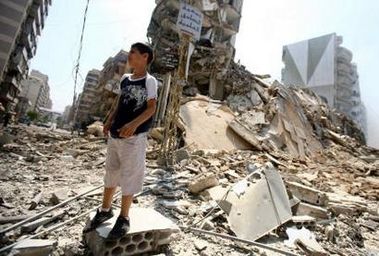 DAY 13, JERUSALEM, July 25 (Reuters) – U.S. Secretary of State Condoleezza Rice meets Israel’s Prime Minister Ehud Olmert on Tuesday for talks on the war in Lebanon with little immediate prospect of a ceasefire with Hizbollah guerrillas. On a stopover in Beirut, battered by two weeks of Israeli bombing, Rice put forward truce proposals similar to Israel’s own demand for Hizbollah to pull back from the border to allow an international force to deploy, Lebanese politicians said.
DAY 13, JERUSALEM, July 25 (Reuters) – U.S. Secretary of State Condoleezza Rice meets Israel’s Prime Minister Ehud Olmert on Tuesday for talks on the war in Lebanon with little immediate prospect of a ceasefire with Hizbollah guerrillas. On a stopover in Beirut, battered by two weeks of Israeli bombing, Rice put forward truce proposals similar to Israel’s own demand for Hizbollah to pull back from the border to allow an international force to deploy, Lebanese politicians said. 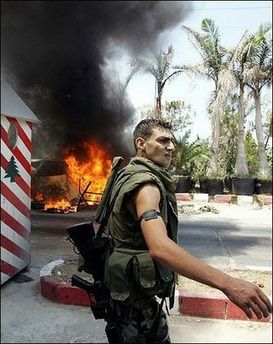 TIME, The journey to Tyre in South Lebanon from Beirut, normally a one hour drive, has become a white-knuckle tear through twisty mountain roads and a bombed-out coastal highway that takes five hours.
TIME, The journey to Tyre in South Lebanon from Beirut, normally a one hour drive, has become a white-knuckle tear through twisty mountain roads and a bombed-out coastal highway that takes five hours.  BEIRUT, Lebanon – Israeli warplanes struck a minibus carrying people fleeing the fighting Sunday in southern Lebanon, killing three people, Lebanese security officials said, and two people were killed as about 90 Hezbollah rockets fell on northern Israel.
BEIRUT, Lebanon – Israeli warplanes struck a minibus carrying people fleeing the fighting Sunday in southern Lebanon, killing three people, Lebanese security officials said, and two people were killed as about 90 Hezbollah rockets fell on northern Israel. 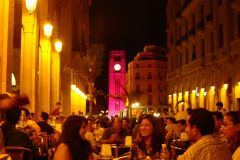 BEIRUT, Lebanon — Fewer restaurants than usual are open, making the narrow street appear dimmer. A staff shortage has owners tending bar, and the menus have thinned.Still, despite the death and destruction wrought by an Israeli offensive against Hezbollah militants, a small and tenacious coterie of war clientele have clung to Beirut’s famed nightlife, hoping for a moment of reprieve from the violence.
BEIRUT, Lebanon — Fewer restaurants than usual are open, making the narrow street appear dimmer. A staff shortage has owners tending bar, and the menus have thinned.Still, despite the death and destruction wrought by an Israeli offensive against Hezbollah militants, a small and tenacious coterie of war clientele have clung to Beirut’s famed nightlife, hoping for a moment of reprieve from the violence.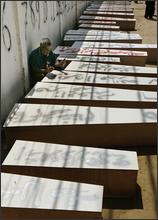 TYRE, Lebanon — Soldiers laid 72 coffins in two trenches, a mass grave for victims of the Israeli bombardment. Elsewhere, mounds of rubble sat undisturbed; rescue workers were too fearful of missiles to search for bodies.
TYRE, Lebanon — Soldiers laid 72 coffins in two trenches, a mass grave for victims of the Israeli bombardment. Elsewhere, mounds of rubble sat undisturbed; rescue workers were too fearful of missiles to search for bodies. Israel massed tanks and troops on the border Friday hours after calling up reserves and confirmed some units were already operating in Lebanon, as the army announced plans for a ground operation to destroy Hezbollah’s tunnels, hideouts and weapons stashes.
Israel massed tanks and troops on the border Friday hours after calling up reserves and confirmed some units were already operating in Lebanon, as the army announced plans for a ground operation to destroy Hezbollah’s tunnels, hideouts and weapons stashes.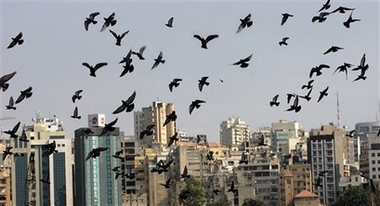 DAY 9, BEIRUT, Lebanon – Pitched battles raged between Israeli forces and Hezbollah fighters on the border Thursday, and Israel warned hundreds of thousands of people to flee southern Lebanon "immediately," preparing for a likely ground offensive to set up a buffer zone. U.N. chief Kofi Annan warned of a humanitarian crisis in Lebanon and called for an immediate cease-fire, even as he admitted "serious obstacles" stand in the way of even easing the violence. Annan denounced Israel for "excessive use of force" and Hezbollah for holding "an entire nation hostage" with its rocket attacks and snatching of two Israeli soldiers last week.
DAY 9, BEIRUT, Lebanon – Pitched battles raged between Israeli forces and Hezbollah fighters on the border Thursday, and Israel warned hundreds of thousands of people to flee southern Lebanon "immediately," preparing for a likely ground offensive to set up a buffer zone. U.N. chief Kofi Annan warned of a humanitarian crisis in Lebanon and called for an immediate cease-fire, even as he admitted "serious obstacles" stand in the way of even easing the violence. Annan denounced Israel for "excessive use of force" and Hezbollah for holding "an entire nation hostage" with its rocket attacks and snatching of two Israeli soldiers last week.


